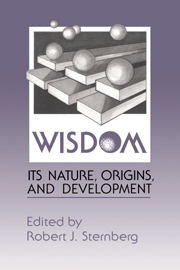Book contents
- Frontmatter
- Contents
- List of contributors
- Preface
- Part I Approaches to the study of wisdom
- Part II Approaches informed by philosophical conceptions of wisdom
- 2 Wisdom through the ages
- 3 The psychology of wisdom: an evolutionary interpretation
- 4 Wisdom as integrated thought: historical and developmental perspectives
- Part III Approaches informed by folk conceptions of wisdom
- Part IV Approaches informed by psychodevelopmental conceptions of wisdom
- Part V Integration of approaches and viewpoints
- Name index
- Subject index
2 - Wisdom through the ages
Published online by Cambridge University Press: 05 June 2012
- Frontmatter
- Contents
- List of contributors
- Preface
- Part I Approaches to the study of wisdom
- Part II Approaches informed by philosophical conceptions of wisdom
- 2 Wisdom through the ages
- 3 The psychology of wisdom: an evolutionary interpretation
- 4 Wisdom as integrated thought: historical and developmental perspectives
- Part III Approaches informed by folk conceptions of wisdom
- Part IV Approaches informed by psychodevelopmental conceptions of wisdom
- Part V Integration of approaches and viewpoints
- Name index
- Subject index
Summary
In this brief historical review of the topic of wisdom, selectivity is not only unavoidable but also unavoidably arbitrary. The subject forms perhaps the major chapter in the history of philosophy where it is often inextricably joined to political, moral, and jural matters. It is also both the aim and the target of various literary genres, of scripture, meditation, and the saintly ways of life. Most of this falls beyond the editor's expectations, not to mention the author's gifts. A manageable alternative, and the one adopted here, calls for a summary of the teachings of the major philosophers and their disciples or schools and the extent to which these teachings have found or might have found a place within that “mental science” of the 19th century that has now matured into “cognitive science.”
Socrates (4697–399 B.C.)
Long before the advent of genuinely philosophical modes of analysis and inquiry there was a prosperous folk philosophy contained in the epic poems attributed to Homer, epics that imposed a discernible pattern on the thoughts and perspectives of the more influential teachers in Hellenic and Hellenistic Greece. I have dealt with this at greater length elsewhere (Robinson, 1989), but the main points should be noted.
It is a feature of epic literature to teach lessons and to explain the causes of things through the medium of a story.
Information
- Type
- Chapter
- Information
- WisdomIts Nature, Origins, and Development, pp. 13 - 24Publisher: Cambridge University PressPrint publication year: 1990
Accessibility standard: Unknown
Why this information is here
This section outlines the accessibility features of this content - including support for screen readers, full keyboard navigation and high-contrast display options. This may not be relevant for you.Accessibility Information
- 60
- Cited by
